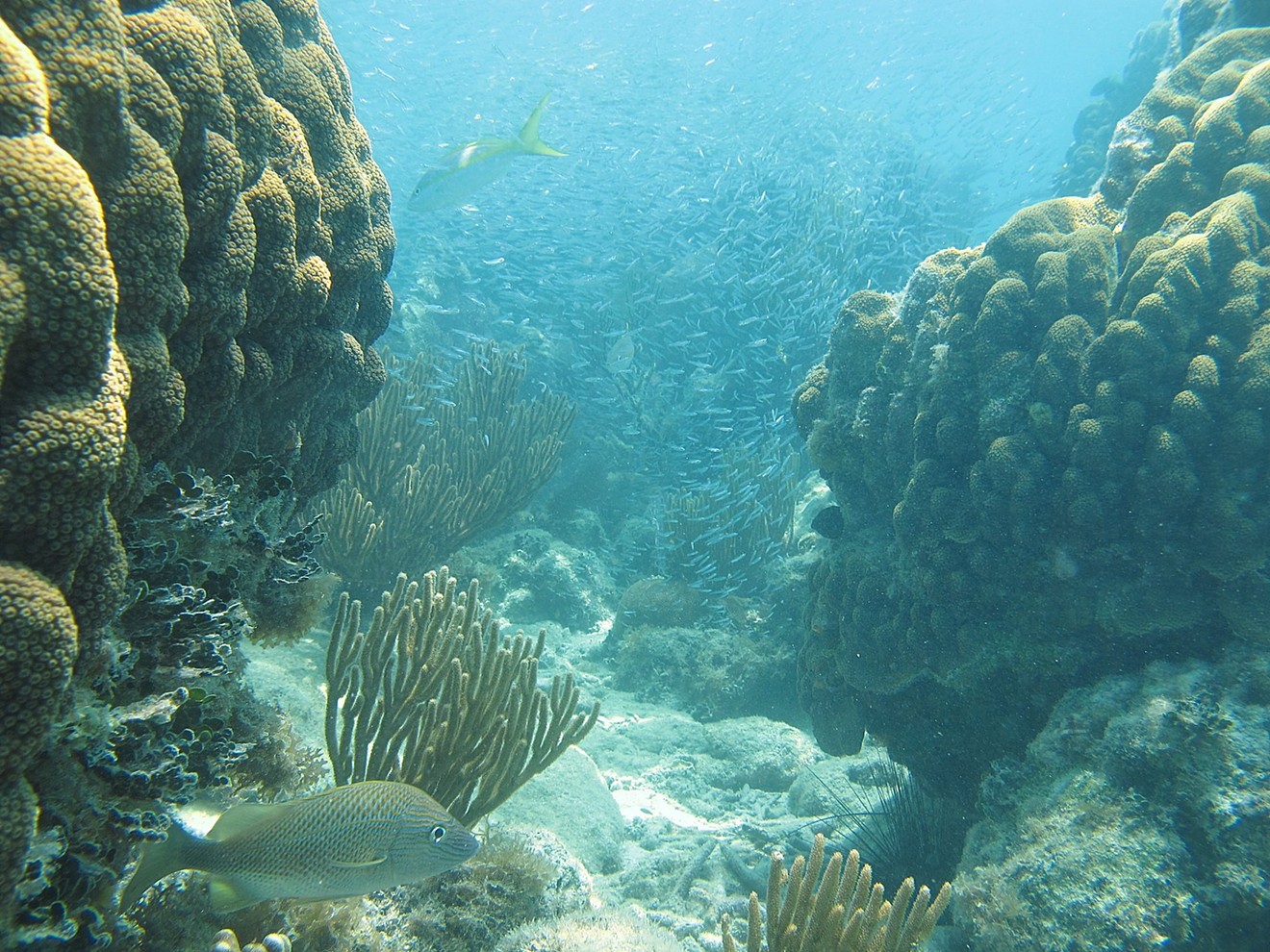There should be little controversy in saying that 2019 has been a particularly crappy year — in some cases, literally — for South Florida's once-vibrant ecosystems. Through negligence and neglect, Miami politicians and businesses have allowed for dirtier waters and dying coral reefs in spite of unceasing complaints from residents and environmental activists. In the interest of making 2020 less of an environmental nightmare than 2019, New Times has assembled a depressingly ample, but by no means comprehensive, list of the many ways the Magic City kicked the environment while it was down this year.
Let's hope this is rock bottom, because it's a long way up from here.
1. Cracks in a sewage pipe under the bridge to La Gorce Island in Mid-Beach spilled more than 800 gallons of raw sewage into Biscayne Bay. The October leak, which lasted for nearly 16 hours, according to Miami Beach officials, could be the first of many such wastewater disasters in the coming months, because the city's public-works department found that temporary repairs to the pipe led to the discovery of other cracks, "which can fail at any moment." The Mid-Beach spill came a few months after ruptured pipes near Oleta River State Park spewed some 1.5 million gallons of waste into that river and Biscayne Bay, and within weeks of a 35,000-gallon sewage spill on Virginia Key caused by equipment failure in the '50s-era treatment plant. The result was a series of severe no-swim warnings near both spills.
2. The troubling frequency of these spills is in large part due to the poor maintenance of much of South Florida's sewage and treatment infrastructure that can go years to more than a decade without being checked, never mind fixed or replaced. Despite Miami-Dade County's very real water-quality problems, in September local lawmakers toyed with the notion of slashing the budget for an already underfunded Water and Sewer Department (WASD) responsible for the upkeep and replacement of sewer pipes.
3. No environmental obituary would be complete without the mention of the cruise industry. In May 2019, researchers found that dredging projects at PortMiami likely were responsible for widespread coral reef damage. The peer-reviewed study concluded that a half-million corals were killed between 2013 and 2015, when the port was widened. Natural storm-surge barriers, Florida's reefs protect an estimated $1.6 billion in real estate and play an important role in the region's underwater ecosystems. The state's offshore corals were already threatened by climate change and pollution: According to Miami Waterkeeper, Florida's offshore reefs have declined 70 percent since the '70s.
4. Florida Power & Light's nuclear-energy station in South Miami-Dade leaked saltwater into a main source of drinking water for South Floridians, who were then made to pay for the cleanup. FPL is loathed far and wide across the state, but this year's debacle at Turkey Point was a particularly low point for the utility company. The nuclear plant uses a unique cooling method that involves a 5,900-acre series of canals that stretch along Biscayne Bay. Unfortunately, and perhaps unsurprisingly, these canals, which were built in the early '70s, have suffered from inadequate maintenance and sprung many leaks in the years since. The result of the most recent leak was an enormous saltwater plume that threatened the area's primary source of drinking water. Despite FPL's involvement in the leak, judges on the Florida Supreme Court ruled unanimously that the utility company was within its rights to charge Florida residents extra to mop up the mess caused by its own equipment.
5. Sunny Isles Beach investigates the use of carcinogenic herbicide chemicals on public property. And it happened on a playground for children, no less. It began in December, when a resident taking her daughter to a park near her home spotted a worker spraying the grounds with a chemical, which turned out to be Roundup, a weed killer whose active ingredient, glyphosate, is widely believed to be hazardous to human health. City officials say that they're investigating the matter and that existing contracts with landscapers already restrict the use of Roundup. Other South Florida cities, including Miami Beach and Miami, have banned Roundup and similar weed killers, which have been at the center of several high-dollar lawsuits. In March, a California jury awarded $2 billion to a married couple who claimed they contracted non-Hodgkin's lymphoma because of Roundup. Bayer, the parent company of Monsanto, which produces Roundup, denies the product causes cancer and has appealed the verdicts against it.
[
{
"name": "Air - MediumRectangle - Inline Content - Mobile Display Size",
"component": "19274298",
"insertPoint": "2",
"requiredCountToDisplay": "2"
},{
"name": "Editor Picks",
"component": "17482312",
"insertPoint": "4",
"requiredCountToDisplay": "1"
},{
"name": "Inline Links",
"component": "18711090",
"insertPoint": "8th",
"startingPoint": 8,
"requiredCountToDisplay": "7",
"maxInsertions": 25
},{
"name": "Air - MediumRectangle - Combo - Inline Content",
"component": "17482310",
"insertPoint": "8th",
"startingPoint": 8,
"requiredCountToDisplay": "7",
"maxInsertions": 25
},{
"name": "Inline Links",
"component": "18711090",
"insertPoint": "8th",
"startingPoint": 12,
"requiredCountToDisplay": "11",
"maxInsertions": 25
},{
"name": "Air - Leaderboard Tower - Combo - Inline Content",
"component": "17482313",
"insertPoint": "8th",
"startingPoint": 12,
"requiredCountToDisplay": "11",
"maxInsertions": 25
}
]












